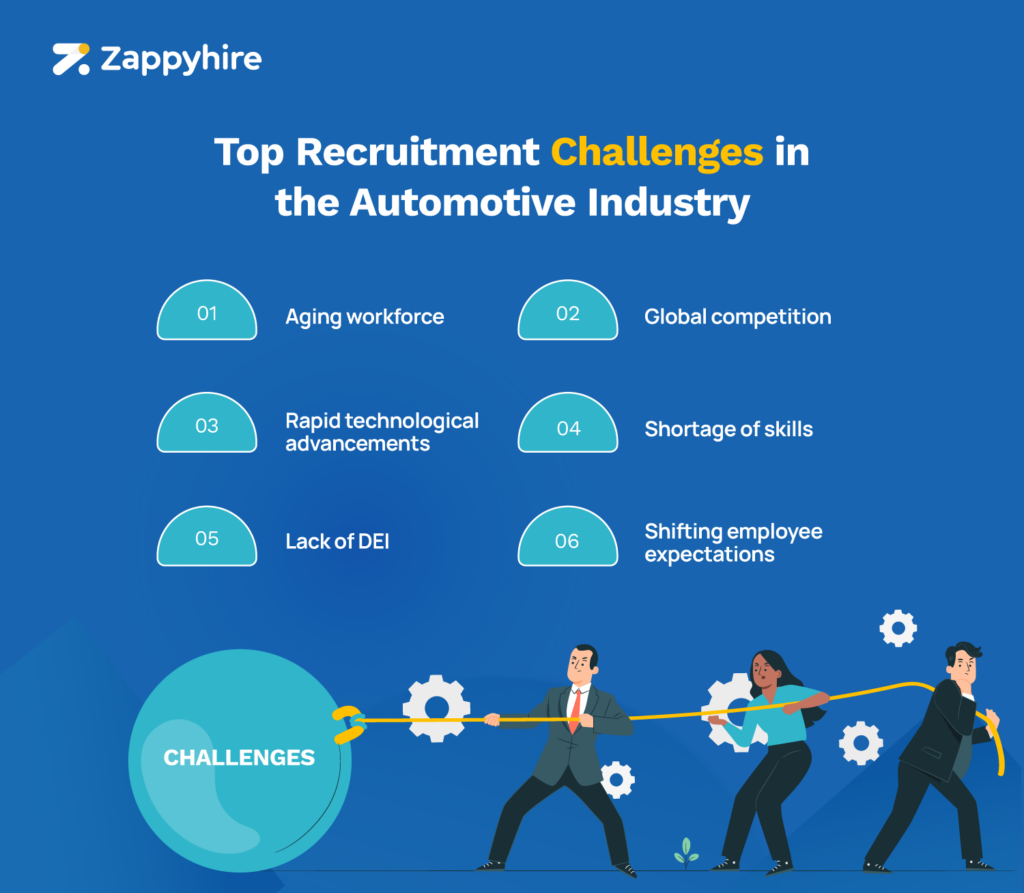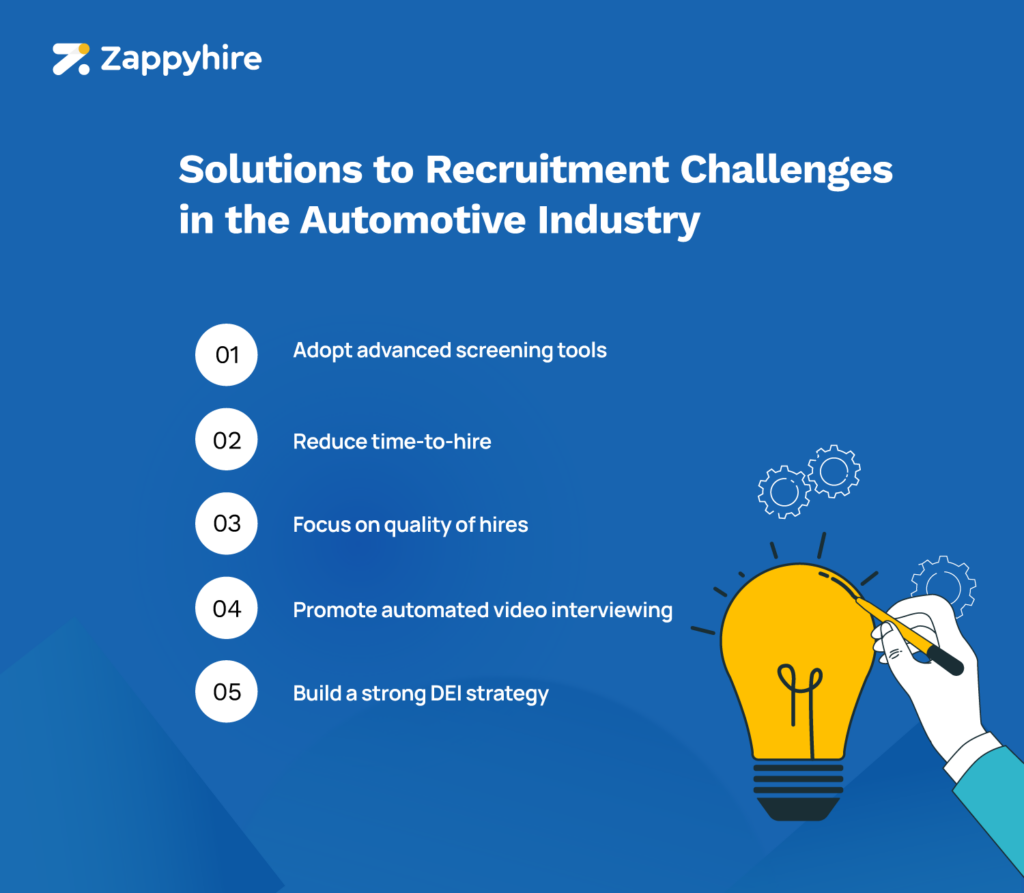
The automotive industry is currently going through a lot of transformations with the rise of electric vehicles (EVs) and automated manufacturing processes, such as megacasting technology.
However, up to 60% of employers report difficulties in finding candidates with the necessary skills, particularly in technical areas.
What these advancements require is a workforce equipped with specialized skills in electronics, automation, and sustainable engineering practices.
What specific skills are most in demand in the automotive sector today?
Here’s a breakdown of the in-demand skills and why they matter:
Mastery in EV and battery technologies
Engineers with expertise in battery design, energy storage systems, and EV infrastructure are crucial.
This is especially true when companies like Tesla and Rivian need engineers to develop high-capacity, long-lasting batteries and to create fast-charging networks.
Skills in automation and robotics
Specialists in automated manufacturing and robotics programming are key to improving production efficiency.
Automotive plants like those of Toyota and Ford rely on robotics engineers to optimize assembly lines and reduce human error.
Specialization in data analytics and AI
Professionals who can analyze vehicle performance data and use AI to enhance smart systems, like predictive maintenance or self-driving technologies, are in high demand.
Companies like BMW and Waymo use data analysts to improve self-driving car algorithms and enhance user safety features.
Focus on cybersecurity for vehicles
With connected and autonomous vehicles, ensuring secure systems is more important than ever.
Cybersecurity specialists protect cars from hacking and other digital threats.
Connected car features like remote locking or GPS tracking require specialists to safeguard sensitive user data and prevent breaches.
Expertise in sustainable engineering practices
Engineers with a strong understanding of eco-friendly materials and green manufacturing processes are needed to meet growing environmental regulations and customer expectations.
Companies like Volvo are incorporating recycled materials into their vehicles, requiring experts in sustainable design and production methods.
Top recruitment challenges in the automotive industry
The automotive industry’s recruitment challenges are as dynamic as the sector itself. Here’s a closer look.

1. Aging workforce
A large portion of the automotive workforce is nearing retirement, creating gaps in expertise.
Finding replacements with similar levels of experience is tough due to a limited pool of skilled candidates.
2. Global competition
The global nature of the automotive market means companies compete with industry giants for top talent, making it harder to attract and retain skilled professionals.
3. Rapid technological advancements
With the pace of technological change, there is a constant need for upskilling.
Finding professionals who can keep up with these advancements is a major hurdle.
4. Shortage of skills
There is a skill shortage in the labor market, particularly in areas like EV engineering, cybersecurity, and advanced analytics.
5. Lack of Diversity, Equity, and Inclusion (DEI)
The industry struggles with attracting diverse talent, particularly women (as the automotive industry is traditionally seen as male-oriented) and underrepresented groups, due to historical biases and workplace stereotypes.
6. Shifting employee expectations
Today’s workforce seeks more than just a paycheck.
Flexibility, purpose-driven work, and career development opportunities are becoming non-negotiable.
How to tackle recruitment challenges in the automotive sector with innovative solutions?
To effectively tackle recruitment challenges in the automotive industry, these AI-enabled strategies directly address the underlying issues and provide practical, targeted solutions.

1. Advanced screening for in-depth insights
AI-powered screening tools help recruiters identify candidates with diverse skills and expertise, including those from unconventional career paths.
These tools ensure that individuals with transferable skills are given due consideration by broadening the talent pool.
2. Faster hiring in competitive markets
Recruitment tools like automated video interview speed up hiring, ensuring top candidates aren’t lost to competitors.
For instance, a swift interview and offer process can attract candidates who value efficiency, a crucial edge in global automotive recruitment.
3. Elevating the quality of hires
AI-powered skill-based assessments go beyond technical skills to evaluate adaptability to new technologies.
This ensures hires are equipped to keep pace with industry shifts.
For example, companies can assess candidates’ ability to learn new systems or tackle cybersecurity challenges using AI tools.
4. Expanding reach with video interviews
Pre-recorded video interviewing allows companies to assess candidates from diverse regions efficiently, broadening the talent pool.
A global automotive company, for instance, can evaluate talent from multiple countries within a week, creating a robust and diverse pipeline.
5. Strengthening DEI with targeted strategies
AI can support diversity goals by promoting inclusive branding and outreach efforts.
For example, an AI-powered job description generator can be used to eliminate gender bias in wording.
This not only attracts a broader range of candidates but also creates an inclusive environment aligned with modern workforce values.
Future-proofing recruitment in the automotive industry
The road ahead for the automotive industry is one of transformation and opportunity.
More importantly, it’s about creating an environment where diverse perspectives are valued and innovation thrives.
As the industry shifts toward electrification, automation, and sustainability, the workforce must evolve alongside it, blending traditional expertise with cutting-edge skills.
After all, building a talented workforce today means laying the foundation for tomorrow’s breakthroughs.






